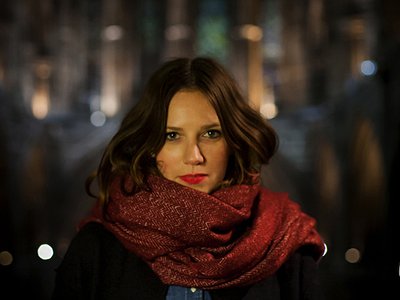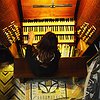Name: Claire M Singer
Nationality: Scottish
Occupation: Composer
, Organist
Current Release: Fairge and Solas on Touch
Recommendations: It’s really hard to narrow it down to two so I’m going to go off of the top of my head. The first is Requiem aeternam by Alfred Schnittke which is an incredible beautiful piece in his Requiem and secondly Cage (1) – (6) 2006 which is a group of six large abstract paintings by Gerhard Richter.
Website / Contact: If you enjoyed this interview with Claire M Singer, do visit her website which offers background information, updates and music.
When did you start writing/producing music - and what or who were your early passions and influences? What is about music and/or sound that drew you to it?
I started playing cello at the age of 7 and piano at 11. From a very early age I much preferred to sit and write my own melodies on the cello and later on the piano rather than play the sheet music that I was given to learn for my lessons. I then started playing in bands from the age of 13 or 14 (first on keyboards and later adding my cello and accordion) and when I got my own Roland keyboard, which introduced me to multi-track recording, my compositions expanded quite dramatically into multi instrumental arrangements and that was it, I knew this is what I wanted to spend all of my time on. I never really wrote the notes down on manuscript it was always recording the piano or cello on to tape or recording on to my Roland floppy disk. I think that’s probably why I chose Studio Composition at university. I liked that you could instantly hear your composition come to life. As I was playing classically on the cello but also playing in the band my writing very much took influence from both styles and is probably why my music today straddles the classical, electronic and contemporary worlds.
I started playing organ when I joined Union Chapel as Music Director of the organ in 2012. I have been composing for organ for about 11 years but the early pieces were written for another organist to play. In 2006, when I was commissioned to write my first organ piece for the SOUND Festival in Scotland, I remember expressing quite a lot of concern to organist Roger Williams that perhaps they had chosen the wrong composer for the job, as at that time I was writing quite abstract experimental works. Nevertheless I went to meet the Aubertin organ at Kings College Aberdeen and realised I couldn’t be more wrong about the capabilities and unimaginable breadth of the instrument.
When I started working at Union Chapel I had the keys to one of the most beautiful organs in the world so I used to sit for hours on end and experiment. I’ve never had an organ lesson but I developed my own way of playing and slowly reduced the amount of electronics I was using. I experiment a lot with the mechanical stop action, which basically lets you precisely control how much wind enters the pipe. Over the years I have learnt every single incremental sound you can make on that organ and that’s how I developed pieces like The Molendinar. I have had many people ask me over the years what electronics I am using in the piece but it’s all organ, one take no overdubs. Completely acoustic.
For most artists, originality is first preceded by a phase of learning and, often, emulating others. What was this like for you? How would you describe your own development as an artist and the transition towards your own voice? What is the relationship between copying, learning and your own creativity?
For sure from an early age I was learning pieces by other composers on my cello and piano and of course listening to lots of music of varying styles. Then at university I studied the language of many periods/styles/composers and learnt all the ‘rules’ of harmony etc. But for me I always felt my own writing was quite separate to this.
I’ve always had a very strong creative instinct and direction. I record everything I write and listen to it over and over to figure out how it can be better and what I’m missing. I’m constantly learning from my own performances and running through pieces in my head.
My voice has naturally evolved through time, playing in bands and orchestras, studying composition at university and a major turning point for me was when I started playing the organ. This ultimately developed my voice to where it is now but I still have so much more to explore.
What were your main compositional- and production-challenges in the beginning and how have they changed over time?
I would say the main production challenge I face every time I record is trying to capture the organ in the best way. I experiment with the slow release of wind into the pipes so I want to capture that very first moment of release. Therefore I like the microphones to be very close to the pipes, however doing this means you lose the sense of the space the organ sits in. I do use microphones further back but it’s always a balance challenge. I remember for my debut album Solas I went through every single reverb I could find to add some warmth back into the recording. It took me weeks to work out the best one and we are only talking about a fraction to take the edge off. I doubt this challenge will ever change as each organ and space is different, you can’t apply the same technique for each one.
What was your first studio like? How and for what reasons has your set-up evolved over the years and what are currently some of the most important pieces of gear for you?
Well my very first studio was at Goldsmiths College where I studied performance and composition. After I graduated I moved my setup into my bedroom and have only recently finally got a space of my own. My set up is pretty minimal, because I mainly work with acoustic instruments. I work outside of my studio quite a bit. Then I work on the files in Pro Tools with various plugins but to be honest I mainly use acoustic instruments and reverb and that’s it! I recently bought Altiverb, which is pretty amazing! It’s a convolution reverb plug-in which enables you to put your recording in a huge amount of spaces ranging from the cockpit of plane (!) to some of the most beautiful concert halls in the world.
How do you make use of technology? In terms of the feedback mechanism between technology and creativity, what do humans excel at, what do machines excel at?
I used to work with technology a lot more than I do now. When I was studying at Goldsmiths I had access to state of the art studios with a massive amount of plugins. Now I am more interested in how create an electronic type timbre on acoustic instruments through extended technique. The only technology I use is my laptop with Pro Tools for editing and mixing and a few reverb plugins plus my Sontronics microphone for my cello. Answering your question about what machines excel at I would say technology enables me to capture the best possible version of a live piece and allows me to intricately work with the sound to sculpt into the final piece of work. I also write more effectively by recording in layers and improvising over those layers, which will then become a scored work.
Production tools, from instruments to complex software environments, contribute to the compositional process. How does this manifest itself in your work? Can you describe the co-authorship between yourself and your tools?
I record, edit and mix in Pro Tools so it plays a huge part in my compositional process. On my album Solas and on my latest release Fairge I play both the organ and cello. Sadly I have not perfected playing them both at the same time. ;) So Pro Tools enables me to bring it all together and create the end composition. As mentioned previously the only plugin I regularly use is reverb, which plays a huge part in the sound I create. I very much think of it as an instrument which needs to be explored and perfected.
Collaborations can take on many forms. What role do they play in your approach and what are your preferred ways of engaging with other creatives through, for example, file sharing, jamming or just talking about ideas?
I don’t collaborate too often but I do feel it is an important part of being an artist. Through each collaboration I learn about myself in a way I can’t when working alone and I also learn from others through their creative approaches. If anything it just sparks new energy.
My collaborations have always taken shape from talking through ideas (especially if I am writing for someone) and through jamming. The latter I do most often. Having come from a background of playing in bands I started this from an early age and now even when I’m writing alone I use this approach by recording lines into my laptop and jamming over the top.



